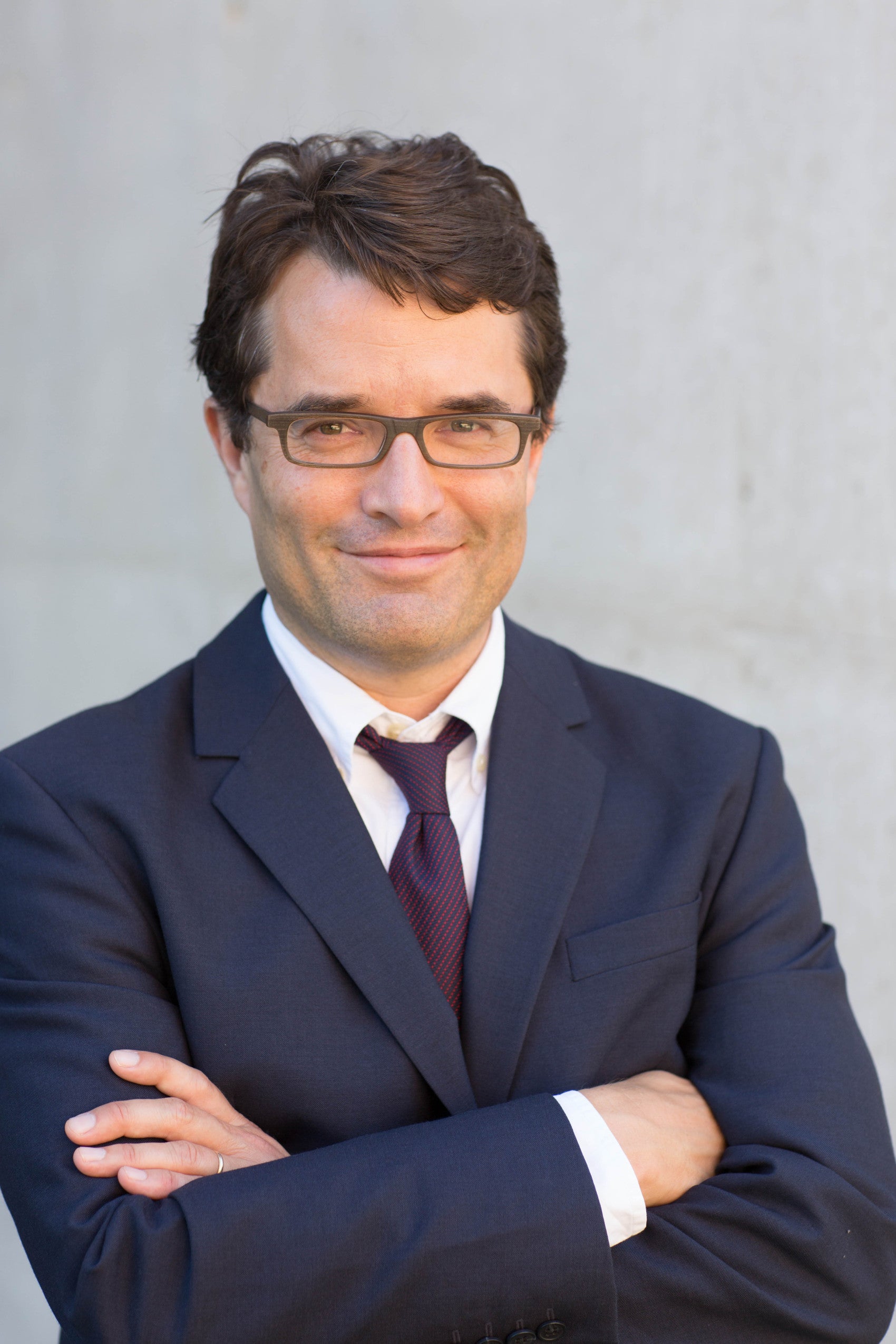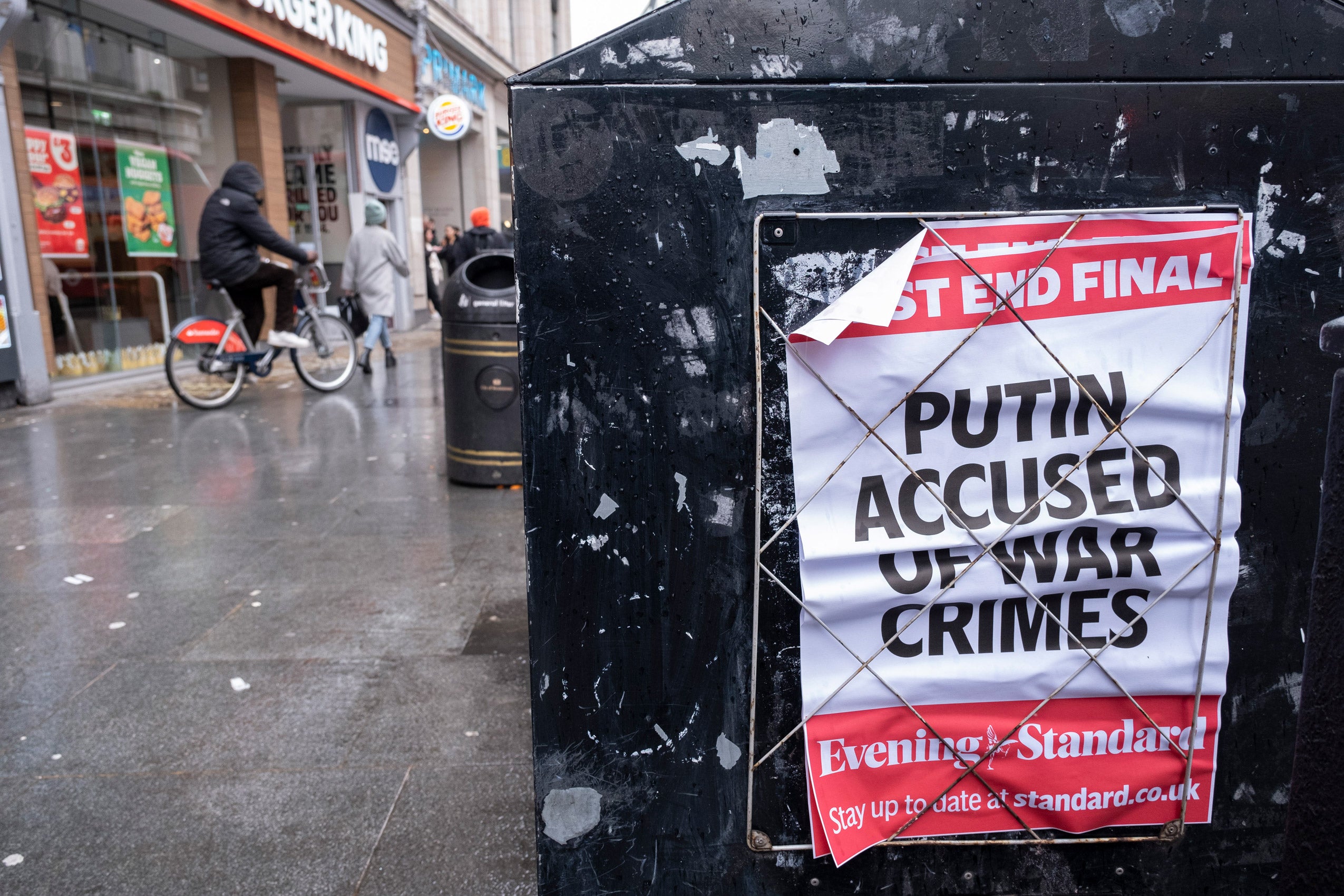The chief prosecutor of the International Criminal Court, Karim Ahmad Khan, recently launched an investigation of war crimes and crimes against humanity allegedly committed amid Russia’s invasion of Ukraine. To understand how the investigation and potential prosecutions might proceed, Harvard Law Today spoke to Alex Whiting, a visiting professor of practice at Harvard Law and the current deputy specialist prosecutor at the Kosovo Specialist Prosecutor’s Office in The Hague. He previously served as a prosecutor at the International Criminal Court and also the International Criminal Tribunal for the Former Yugoslavia. Whiting says that despite the challenges of gathering evidence in a conflict zone and arresting those involved, international criminal investigations focus attention on the ongoing crimes and their victims, and ultimately send a message to perpetrators that “the arm of justice is long.”
Harvard Law Today: You are speaking to us today from The Hague, monitoring the war in Ukraine from a much closer distance than we are in Cambridge, Massachusetts. How are you experiencing it?
Alex Whiting: Since this court was set up by the European Union, it is staffed almost entirely by people from European countries. And I can tell you that the war has hit people here very hard, both because of the work we do and our commitment to international law, and because we know what can happen and what is going to happen during this conflict. There is shock about the violation of international law. But also, for Europeans, this is right here, and it feels very close. Many people here have connections to people in Ukraine, have spent time there, have worked with people there, know people there. So, it feels very close, very personal, and very upsetting for people here.
HLT: Ukrainian President Volodymyr Zelinsky has accused Russia of war crimes. What is the process of investigating those allegations?

Whiting: Those allegations will be investigated by the International Criminal Court. The court has 123 member states, but neither Russia nor Ukraine is a party. However, back in 2015 when Russia invaded and annexed Crimea, Ukraine referred the conflict to the court for investigation. And there’s a provision in the Rome Statute — article 12.3 — which allows states that are not members of the court to refer a conflict and allegations of crimes to the court. But an investigation has to be triggered, and one way for that to happen is if one of the 123 member states asks the court to investigate. And it was just announced Thursday night that 39 states referred the Ukraine situation to the International Criminal Court for investigation. So, the prosecutor of that court announced that he is immediately opening up an investigation and will start collecting evidence. That investigation is also open into past crimes that could have occurred in the Crimea and eastern Ukraine.
HLT: Why is it important for the court to begin investigating now, rather than waiting for the conflict to end?
Whiting: Investigations and prosecutions are important even before cases are brought before the court because they bring attention to the crimes that are being committed, and to the victims of these of these crimes. So, even aside from what happens in court down the road, the act of investigating and framing what is happening and naming it is extremely important.
HLT: What types of crimes can the International Criminal Court investigate?
Whiting: The International Criminal Court has jurisdiction over four types of crime: war crimes, crimes against humanity, genocide, and the crime of aggression. And there is no doubt that this is an act of aggression by Russia against Ukraine. However, the crime of aggression has a particular requirement, which is different from all the other crimes. It can only be prosecuted by the court if one member state commits an act of aggression against another. Since neither Russia nor Ukraine is a member, the crime of aggression here does not apply. So, the International Criminal Court is focusing on war crimes, and it will also consider crimes against humanity if they arise.
HLT: There is also an International Court of Justice. What role does it play?
Whiting: The International Criminal Court investigates and prosecutes international crimes committed by individuals. The International Court of Justice resolves disputes between states. Ukraine has brought an emergency case before that court, which will be heard next week. The focus of Ukraine’s complaint is that Russia has used as one of its justifications — I’ll say, phony justification — for invading Ukraine the allegation that there is a threat of genocide against Russian nationals living in Ukraine. Ukraine says this is nonsense. The ICJ should rule that there is no such threat and that assertion cannot be used as a justification for the invasion.
HLT: Who can the ICC prosecute? Only state leaders? Or everybody who was involved? And does it look at people from both sides?
Whiting: With respect to whether it’s both sides, the answer to that is yes. Now, of course, at the moment the allegations of crimes are being made against the Russians invading Ukraine. But the ICC is neutral and will investigate all allegations of crimes.
With respect to who gets investigated, the ICC tries to focus always on those most responsible, so the big fish, whether those are political leaders or military leaders. However, all of the international courts, including the ad hoc tribunals and the International Criminal Court, have also been willing at times to prosecute mid-level actors who have been particularly instrumental in the commission of the crimes. So, in this case, when we’re thinking about potential targets in the Russian military or Russian political figures, it’s very possible that mid-level commanders who are operating in Ukraine could become the focus of investigations by the ICC.
HLT: Unlike previous conflicts, this war is happening at a time when everyone carries a recording device in their pocket. What role do you think video collected on cell phones will play as the ICC collects evidence?
Whiting: That’s a fascinating development in this field that I think ultimately will be a real game changer in the way these cases are investigated and prosecuted. The number one challenge faced by international courts, and by the ICC today in Ukraine, is getting access to the places where the alleged crimes are being committed, where the bombs are falling, and where people are being killed. It’s very difficult for investigators from The Hague to travel to those places to gather evidence while the conflict is still ongoing. So, more and more there is discussion about how first responders and people on the scene can take steps to preserve evidence. And one of the ways is using a cell phone to take videos, which allows for the possibility of gathering significant evidence in real time and preserving it.
However, it is enormously complicated for three reasons. The first and most important is there can be serious security and safety concerns for the people who are gathering the evidence, or people who might be captured in the videos. So, even while you’re collecting the evidence, you have to be thinking ahead to the day when you’re going to make that public, and there could be security concerns for the people connected with that collection. Secondly, there are very complicated issues about authenticating that evidence; was that video really taken on that day at that location? And the third thing is the organizational challenge of managing the massive amount of information pouring out of the country. So, there is real promise here. And we’ve already seen videos coming out of Ukraine which suggest potential war crimes having been committed. But it’s an extraordinarily challenging investigation to manage.
HLT: How long do these investigations take? Is there a statute of limitations?
Whiting: There is no statute of limitations, which is the good news. But the investigation can sometimes be lengthy, just because of the challenges of collecting the evidence while the conflict is ongoing in real time, especially against senior political or military leaders. Another cause of significant delay is trying to make the arrest. So, for example, in the Ukraine case, if cases were brought against Russian political or military leaders, it might take a very long time before any of those people, who would presumably be in Russia, could ever be arrested. So, these cases can sometimes start moving within a year or two, but sometimes it takes many, many years before they come to court. Even when they do take a long time — and let’s remember that it was only a few years ago that we were still trying cases from World War II in Germany — justice still is served and a message is sent to perpetrators today that the arm of justice is long.
HLT: What are the possible punishments?
Whiting: Although there is a notional maximum penalty of 30 years at the International Criminal Court, there’s a provision that allows for an upward departure in particularly egregious cases. Trying to conceive of a sentencing scheme for these sorts of cases is complicated. And you can see quite a range of sentences, from 10 to 15 years up to life imprisonment.
HLT: How would you evaluate the success of the international justice system, and what can or should be done to strengthen it?
Whiting: We have to keep in mind that this is a very new project. The first international tribunal, of course, was at Nuremberg. But after Nuremberg and the Tokyo courts, there was nothing for 50 years until the Yugoslavia court in 1993. So, it’s been less than 30 years in the modern era that we’ve been at this project. If in 1993, you said to people that we were on the cusp of an era when there would be multiple ad hoc tribunals and a permanent international criminal court and that there’d be accused persons, trials, convictions, acquittals, and sentencings, and that some of the top leaders in some of these conflicts would be brought to justice, nobody would have believed you. And so, in some ways, this project has wildly exceeded any expectations.
However, if you do this work, you feel every day the frustrations and the challenges and the stresses as well as the limitations of the powers that these courts have been granted. It’s never enough. It’s incomplete. It’s just a beginning. There are ups and downs. And we have successes and failures. But I always hope that we’re moving towards a better future that we’re moving towards this becoming a norm. What do we need for success? The main thing that we need for success is for all states in the world to support this kind of international justice, by joining the ICC and actively cooperating in and supporting these investigations and prosecutions.
HLT: Is there anything you’d like to add?
Whiting: The one thing I would come back to is the point about aggression, because aggression was actually the main crime at Nuremberg. None of the modern tribunals that came after have had jurisdiction over the crime of aggression. And the International Criminal Court only got jurisdiction over the crime of aggression in 2018. Only 43 of the 123 member states have ratified that additional crime. But today, with the invasion of Ukraine by Russia, we see very dramatically why the crime of aggression is so important. And we have renewed the discussion of how we might do more to be able to prosecute it. So, these events with Russia and Ukraine link back to World War II and Nuremberg with respect to the crime of aggression.
